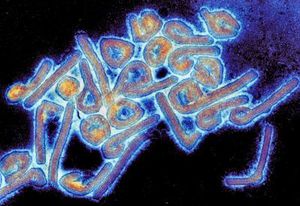Danio Rerio Genetics: Difference between revisions
No edit summary |
|||
| Line 27: | Line 27: | ||
<br> <br> | <br> <br> | ||
==Section 1 | ==Section 1 Development== | ||
Zebrafish reproduce through fertilization of eggs that have been spawned by the females, which release between 5 and 20 eggs per spawning. Upon fertilization, Zebrafish eggs become transparent. This transparency contributes to its use as a laboratory organism, as development is visible. Development of the Zebrafish embryo is also fairly rapid: at 24 hours, the brain, eye, and neural tube are already visible. By 5 days after fertilization, the larvae can independently swim. A short generation time of 10-12 weeks combined with the transparency of its embryos has solidified the Zebrafish’s status as a regularly used model organism..<br><br> | |||
Sample citations: <ref>[http://www.plosbiology.org/article/fetchObject.action?uri=info%3Adoi%2F10.1371%2Fjournal.pbio.1000005&representation=PDF Hodgkin, J. and Partridge, F.A. "<i>Caenorhabditis elegans</i> meets microsporidia: the nematode killers from Paris." 2008. PLoS Biology 6:2634-2637.]</ref> | Sample citations: <ref>[http://www.plosbiology.org/article/fetchObject.action?uri=info%3Adoi%2F10.1371%2Fjournal.pbio.1000005&representation=PDF Hodgkin, J. and Partridge, F.A. "<i>Caenorhabditis elegans</i> meets microsporidia: the nematode killers from Paris." 2008. PLoS Biology 6:2634-2637.]</ref> | ||
Revision as of 03:43, 8 November 2019
Introduction
Zebrafish (danio rerio,) are small freshwater fish naturally found in South Asia. Belonging to the Cyprinidae family, Zebrafish are related to minnows and carps. Zebrafish have an average lifespan of 42 months and a generation time of 3 months. Due to its ease of use in laboratory procedures and its homologies to other, more complex vertebrates, Danio rerio is commonly used as a model organism for vertebrate genetics.
Compose a title for your page.
Type your exact title in the Search window, then press Go. The MicrobeWiki will invite you to create a new page with this title.
Open the BIOL 116 Class 2019 template page in "edit."
Copy ALL the text from the edit window.
Then go to YOUR OWN page; edit tab. PASTE into your own page, and edit.
At right is a sample image insertion. It works for any image uploaded anywhere to MicrobeWiki. The insertion code consists of:
Double brackets: [[
Filename: PHIL_1181_lores.jpg
Thumbnail status: |thumb|
Pixel size: |300px|
Placement on page: |right|
Legend/credit: Electron micrograph of the Ebola Zaire virus. This was the first photo ever taken of the virus, on 10/13/1976. By Dr. F.A. Murphy, now at U.C. Davis, then at the CDC.
Closed double brackets: ]]
Other examples:
Bold
Italic
Subscript: H2O
Superscript: Fe3+
Section 1 Development
Zebrafish reproduce through fertilization of eggs that have been spawned by the females, which release between 5 and 20 eggs per spawning. Upon fertilization, Zebrafish eggs become transparent. This transparency contributes to its use as a laboratory organism, as development is visible. Development of the Zebrafish embryo is also fairly rapid: at 24 hours, the brain, eye, and neural tube are already visible. By 5 days after fertilization, the larvae can independently swim. A short generation time of 10-12 weeks combined with the transparency of its embryos has solidified the Zebrafish’s status as a regularly used model organism..
Sample citations: [1]
[2]
A citation code consists of a hyperlinked reference within "ref" begin and end codes.
Section 2 Microbiome
Include some current research, with a second image.
Conclusion
Overall text length should be at least 1,000 words (before counting references), with at least 2 images. Include at least 5 references under Reference section.
References
Edited by Hannah Schmidt, student of Joan Slonczewski for BIOL 116 Information in Living Systems, 2019, Kenyon College.

